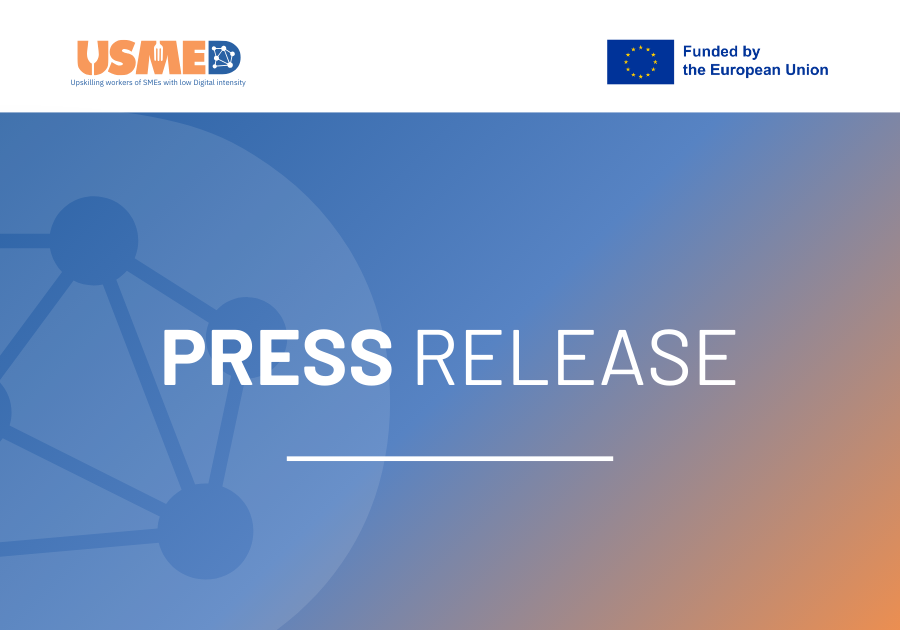New EU-Funded Initiative to Upskill Workers in Low-Digital Intensity SMEs: Official Launch of the USMED Project
Over 32 months, USMED project will develop innovative tools to identify and address digital skills gaps within this specific professional sector, offering ongoing training opportunities.

- 27 January 2025 10:00
According to Eurostat data, the Accommodation and Food sector is one of the least digitalized in Europe, with only 59% of SMEs achieving a minimum level of digital intensity, far from the 90% target set by the European Commission for 2030 in the EU's Digital Decade strategic program.
The COVID-19 pandemic further highlighted the need for digitalization in this sector. However, the lack of digital skills represents a significant barrier, with 79% of workers in the industry not using digital technologies and 70% not participating in digital training courses.
The USMED project, a new EU-funded initiative, seeks to close this gap by empowering workers in the sector with essential digital skills.
USMED Project Overview
Co-funded by the Erasmus+ Programme of the European Union, the USMED project officially started on December 2, 2024. Over 32 months, a consortium of seven organizations from Italy, Poland, Germany, Ireland, Spain, Romania and Turkey will develop innovative tools to identify and address digital skills gaps within this specific professional sector, offering ongoing training opportunities.
Key Project Results
The project will deliver:
- An innovative self-assessment tool for digital skills, specifically designed for hospitality and food service operators.
- A structured methodological framework to analyze and bridge digital skills gaps, supporting a targeted and strategic approach to training.
- A Learning Experiences Catalogue with over 60 micro-learning units designed to address the digital skills gaps identified in the project. It includes resources developed by project partners in English, Italian, Polish, Romanian, Spanish, and Turkish, along with selected materials from other Erasmus+ projects and content created by vocational and training providers, sourced through an open call at local, regional, and national levels.
- A comprehensive digital infrastructure to support innovative training delivery in the accommodation and food sector. It will include an eLearning platform to host the Learning Experiences Catalogue, a Registration Tool that allows VET providers to upload additional resources to enrich the Catalogue and ensure its ongoing relevance, and a Europass Digital Credentials Support Tool that guides VET providers in issuing verifiable Europass Credentials for completed learning experiences, aligned with European standards.
The Consortium
The USMED consortium brings together a diverse group of seven partner organizations with expertise in education, digital innovation, and vocational training:
-
Lascò (Italy - Project Coordinator): A Knowledge Innovation Studio specializing in people-centered digital strategies, blockchain, cloud, AI, IoT, and training.
-
Technological University of the Shannon (Ireland): A multi-campus university offering lifelong learning opportunities and driving regional innovation through high-quality educational programs.
-
Femxa (Spain): A leader in training programs tailored to the needs of companies and individuals, with a focus on employability, competitiveness, and international lifelong learning initiatives.
-
Digital Economy Lab, University of Warsaw (Poland): An interdisciplinary center researching the societal and economic impact of digitalization. Established in 2013 with Google, it transforms research into actionable strategies for businesses and public policies.
-
Colegiul Comercial "Carol I" (Romania): A vocational training institution with over a century of tradition in economics education, offering an optimal learning environment in the fields of commerce, economics, tourism and food services.
-
KUBI (Germany): A Frankfurt-based organization dedicated to the integration of migrants through education, vocational training and democracy promotion.
-
Turkish Culinary Federation (Turkey): TAFED brings together chefs from across Turkey to promote national cuisine internationally. Established in 2006 in Istanbul by eight regional culinary associations, the federation currently comprises 23 associations and operates across the country's seven geographical regions.
About Erasmus+
Erasmus+ is a flagship program of the European Union designed to support education, training, youth, and sports activities. It provides opportunities for individuals and organizations to study, train, gain work experience, and volunteer abroad, fostering personal development, intercultural understanding, and collaboration across European countries and beyond. Erasmus+ promotes cooperation among organizations from various sectors, including education, youth organizations, NGOs, public authorities, and enterprises. It contributes to the modernization and internationalization of education systems, promotes social inclusion and cohesion, and develops essential personal, professional, and social skills.
More Information
For more details about the USMED project and its contributions, contact us at https://www.projectusmed.eu/en/contact
Would you like to receive more information and follow all the results of the project?












